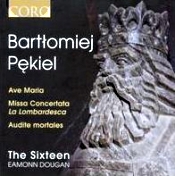Also, Ave Maria, Audite
mortales, Missa a14, and others. Eamonn Dougan, The Sixteen. CORO COR16110.
 Most fans of early music will recognize The Sixteen, the
choir and instrumental group formed by Harry Christophers in 1979 and
specializing in tunes of the Renaissance, Baroque, and early Classical periods.
What early music fans might not recognize so readily is the name Bartlomiej
Pekiel (fl. 1633-1670), a prominent Polish composer of choral music in the
seventeenth century who has today obviously gone out of style. Nevertheless,
under the direction of singer and conductor Eamonn Dougan, The Sixteen here
perform several of Pekiel’s few surviving compositions for choir and
instruments, providing a fascinating glimpse into the music of a long-gone era.
Most fans of early music will recognize The Sixteen, the
choir and instrumental group formed by Harry Christophers in 1979 and
specializing in tunes of the Renaissance, Baroque, and early Classical periods.
What early music fans might not recognize so readily is the name Bartlomiej
Pekiel (fl. 1633-1670), a prominent Polish composer of choral music in the
seventeenth century who has today obviously gone out of style. Nevertheless,
under the direction of singer and conductor Eamonn Dougan, The Sixteen here
perform several of Pekiel’s few surviving compositions for choir and
instruments, providing a fascinating glimpse into the music of a long-gone era.
Pekiel was the first non-Italian to rise to the position
of Royal Maestro di Cappella, and as the disc’s booklet notes explain “set a
benchmark for all native Polish musicians.” Mostly, he worked in the liturgical
field, which we would expect, writing masses and such.
On the present disc, The Sixteen’s Associate Conductor
Eamonn Dougan leads the group first in several selections from Missa a14 (the Kyrie and Gloria, the
only surviving parts). There follows a series of other songs, motets, and
dialogues, including select items from Missa
Concertata La Lombardesca.
Frankly, much early music sounds alike to me, my being no
expert in the field, and the fact that many Italian Baroque composers probably
influenced Pekiel doesn’t make it any easier. Besides, to me most current pop
music, rap, and jazz all sounds alike, so what do I know? The important point
is that The Sixteen perform all of this music from Pekiel with an elegant
touch. The soloists meticulously execute their parts; the divisions of the
choir blend in a honey-like fusion; and the instrumentalists provide an
unobtrusive yet often virtuosic accompaniment.
 Among the various tunes on the program, certainly the Audite mortales stands out for its
magnificent combination of voice sextet, solos, and instrumental ensembles, the
music floating lightly overhead like the most delicate of petals on a breeze.
It is strikingly attractive, singing and playing of the highest order.
Among the various tunes on the program, certainly the Audite mortales stands out for its
magnificent combination of voice sextet, solos, and instrumental ensembles, the
music floating lightly overhead like the most delicate of petals on a breeze.
It is strikingly attractive, singing and playing of the highest order.
Other highlights for me include Dulcis amor Jesu, O adoranda Trinitas,
and the exquisite motet Ave Maria,
with their wonderfully colorful and varied textures. In all, the album is
another success for The Sixteen, who make one wonder if it’s really the music
of Pekiel or the graceful manner in which The Sixteen present it that is more
important. Not to diminish Pekiel in any way, but I rather suspect that The
Sixteen could make the listings in a telephone book sound good.
Producer Raphael Mouterde and engineers Mike Hatch and
Andrew Mellor recorded The Sixteen at St. Silas the Martyr Church, Kentish
Town, London in October 2012. They couldn’t have done a better job. The sound
is warm and smooth, the instruments showing good separation, body, and detail;
the voices truthful, with no brightness, forwardness, or edge to them. The
engineers miked the tunes at a moderate distance, offering an ideal perspective
and depth of image. This is sound you could listen to all day, the kind that no
matter how loud you play it, it never appears anything but natural.
Incidentally, if the name Mike Hatch seems particularly familiar to you, it’s
because he’s spent decades engineering these kinds of realistic-sounding
records; this is a first-rate job all the way around.
To listen to a brief excerpt from this album, click here:
JJP

No comments:
Post a Comment
Thank you for your comment. It will be published after review.